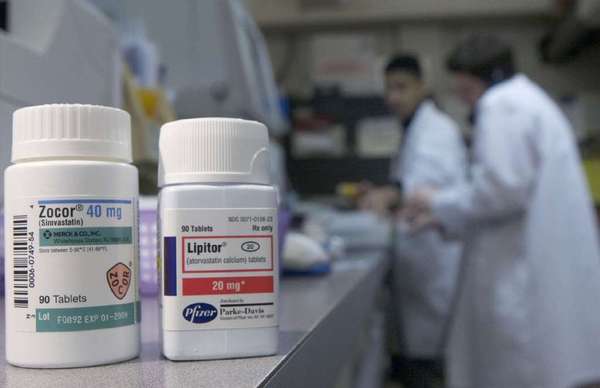Home Tags Posts tagged with "statins"
statins
Cholesterol-lowering drugs statins may have fewer side-effects than claimed, researchers say.
Researchers’ review of 83,880 patients, published in the European Journal of Preventative Cardiology, indicated an increased risk of type-2 diabetes.
But it suggested reports of increases in nausea, muscle ache, insomnia and fatigue were actually inaccurate.
A team at the National Heart and Lung Institute in London analyzed data from 29 clinical trials.
They suggested statins did reduce deaths, but contributed to a high rate of type-2 diabetes. One in five new cases of diabetes in people on statins was a direct result of taking the drugs.

Statins may have fewer side-effects than claimed
Their analysis suggested other side-effects appeared at a similar rate in people taking statins and those given dummy (placebo) pills.
One of the researchers, Dr. Judith Finegold, said: “We clearly found that many patients in these trials – whose patients are usually well-motivated volunteers who didn’t know if they were getting a real or placebo tablet – that many did report side-effects while taking placebo.
“In the general population, where patients are being prescribed a statin for an asymptomatic condition, why would it be surprising that even higher rates of side-effects are reported?
“Most people in the general population, if you repeatedly ask them a detailed questionnaire, will not feel perfectly well in every way on every day.
“Why should they suddenly feel well when taking a tablet after being warned of possible adverse effects?”
According to new guidelines, a third of all adult Americans should consider taking cholesterol-lowering statin drugs.
The first such new guidelines in a decade estimated that 33 million Americans – 44% of men and 22% of women – would meet the threshold for taking statins.
The new recommendations were issued by two leading US medical organizations, American Heart Association (AHA) and American College of Cardiology.
The statins are currently recommended for 15% of adults.
The guidelines for the first time take aim at strokes, not just heart attacks.
Under the current advice, statins are recommended for those who have total cholesterol over 200 and LDL, or “bad cholesterol”, of over 100.
The new recommendations place much less emphasis on setting numerical cholesterol-lowering targets for patients.
The advice introduces a new formula for calculating a patient’s risk of heart disease based on such factors as age, gender and race, instead of high cholesterol levels alone.

Heart health panel recommends statins for a third of US adults
“This guideline represents a departure from previous guidelines because it doesn’t focus on specific target levels of LDL, or bad cholesterol, although the definition of optimal LDL cholesterol has not changed,” Dr. Neil Stone, author of the report, said in a statement.
It is thought that more women and African-Americans, who are deemed to be at higher risk of stroke, could find themselves taking statins if they follow the guidelines.
The panel focused on four groups they believe statins would benefit most: people already suffering from heart disease; those with LDL levels of 190 or higher because of genetic risk; older adults with type 2 diabetes; and older adults with a 10-year risk of heart disease greater that 7.5%.
The panel also recommended a “diet pattern” based on vegetables, fruits and whole grains and moderate to vigorous exercise three to four times a week for all adults.
Roughly half of those drafting the guidelines had financial ties to makers of heart drugs.
But panel leaders said that no-one with industry connections was allowed to vote on the actual recommendations.
“It is practically impossible to find a large group of outside experts in the field who have no relationships to industry,” Dr. George Mensah, of the AHA, told the Associated Press news agency.
Dr. George Mensah said the guidelines were based on solid evidence.
Many of the patents on popular statins, such as Lipitor and Zocor, have expired, with generic versions being offered cheaply.
But Crestor, a statin made by AstraZeneca, remains under patent, with sales of $8.3 billion in 2012.
[youtube cfJLpuRm0b0 650]
Some statins, drugs taken to protect the heart, may increase the risk of developing type-2 diabetes, according to researchers in Canada.
Their study of 1.5 million people, in the British Medical Journal, suggested powerful statins could increase the risk by 22% compared with weaker drugs.
Atorvastatin was linked to one extra case of diabetes for every 160 patients treated.
Experts said the benefits of statins still outweighed any risks.

Powerful statins increase type 2 diabetes risk by 22 percent
Statins are a group of commonly prescribed drugs that lower the levels of bad cholesterol in the blood. This reduces the chances of a heart attack or stroke.
A team of researchers from hospitals in Toronto said there had been controversy around the risk of diabetes with different statins.
They looked at medical records of 1.5 million people over the age of 66 and compared the incidence of diabetes between people taking different statins.
Their report said: “We found that patients treated with atorvastatin, rosuvastatin, or simvastatin were at increased risk of new onset diabetes compared with those treated with pravastatin.
“Clinicians should consider this risk when they are contemplating statin treatment for individual patients.
“Preferential use of pravastatin… might be warranted.”
Commenting on the study, Prof. Risto Huupponen and Prof. Jorma Viikari, from the University of Turku, in Finland, said: “The overall benefit of statins still clearly outweighs the potential risk of diabetes.”
However, they said, the different statins should be targeted at the right patients.
They said: “The most potent statins, at least in higher doses, should preferably be reserved for patients who do not respond to low-potency treatment, but have a high total risk of cardiovascular disease.”
Specialists have warned of a “lack of knowledge” about the dangers of mixing some medications with grapefruit.
Grapefruit can cause overdoses of some drugs by stopping the medicines being broken down in the intestines and the liver.
The researchers who first identified the link said the number of drugs that became dangerous with grapefruit was increasing rapidly.
They were writing in the Canadian Medical Association Journal.
The team at the Lawson Health Research Institute in Canada said the number of drugs which had serious side effects with grapefruit had gone from 17 in 2008 to 43 in 2012.
They include some drugs for a range of conditions including blood pressure, cancer and cholesterol-lowering statins and those taken to suppress the immune system after an organ transplant.
Chemicals in grapefruit, furanocoumarins, wipe out an enzyme which breaks the drugs down. It means much more of the drug escapes the digestive system than the body can handle.
Three times the levels of one blood pressure drug, felodipine, was reported after patients had a glass of grapefruit juice compared with a glass of water.
The side effects are varied depending on the drug, but include stomach bleeds, altered heart beat, kidney damage and sudden death.
Dr. David Bailey, one of the researchers, said: “One tablet with a glass of grapefruit juice can be like taking five or 10 tablets with a glass of water and people say I don’t believe it, but I can show you that scientifically it is sound.
“So you can unintentionally go from a therapeutic level to a toxic level just by consuming grapefruit juice.”

Specialists have warned of a lack of knowledge about the dangers of mixing some medications with grapefruit
The report said: “We contend that there remains a lack of knowledge about this interaction in the general health care community.”
They added: “Unless health care professionals are aware of the possibility that the adverse event they are seeing might have an origin in the recent addition of grapefruit to the patient’s diet, it is very unlikely that they will investigate it.”
Other citrus fruits such as Seville oranges, often used in marmalade, and limes have the same effect.
Neal Patel, from the British Royal Pharmaceutical Society said: “Grapefruit isn’t the only food that can cause issues, for example milk can stop the absorption of some antibiotics if taken at the same time.
“Although some of these interactions may not be clinically significant, some may lead to more serious outcomes.
“Pharmacists are the best port of call for anyone concerned about how their diet may affect their medication. Information about any interactions would always be included in the patient information leaflet that comes with the medicine.”
Thousands of people taking common statin simvastatin are to have their dose reduced due to fears over side effects.
The medicines regulator has warned that patients taking one particular type – simvastatin – at the same time as other drugs used to reduce high blood pressure are likely to suffer more muscle aches and pains.
And for the first time, it has produced a patient leaflet to inform people of the changes being made.
Statins have been hailed as a wonderdrug which can slash cholesterol and protect against a host of chronic illnesses.
But the Medicines and Healthcare products Regulatory Agency (MHRA) in UK is concerned that some people taking other drugs with them could suffer painful muscle problems, lung disorders and kidney damage.
Every day eight million people in the UK take various statins, which cost as little as 40p (60 cents) a day.
Simvastatin is the most frequently prescribed one; last year GPs gave out almost three million prescriptions for it in England alone.
But studies have shown that patients taking simvastatin, particularly the 40 mg dose which is the most commonly prescribed in England, suffered more problems if they were also on amlodipine and diltiazem.
These are used to treat high blood pressure and chest pain associated with heart disease and they are often prescribed with simvastatin.
The side effects are those usually associated with statins, including muscle problems such as pain, tenderness, weakness and cramps and more rarely muscle breakdown leading to kidney damage.
These occurred more frequently when patients were on both drugs at the same time.

Thousands of people taking common statin simvastatin are to have their dose reduced due to fears over side effects
The general advice from the MHRA is that patients should not stop taking simvastatin. However, if they experience any muscle pain, weakness or cramps whilst taking simvastatin, they should stop taking it and see their doctor as soon as possible.
Doctors may lower the simvastatin dose as the side effects were less common when patients were on a 20 mg dose, or switch them to another statin.
Despite advocates saying that everyone over 50 should be statins, the side effects are well-documented.
Some taking the drugs suffer mild side-effects such as insomnia and stomach upsets, but others complain of agonizing muscle pain and there have been reports about patients developing a rare but serious lung disorder.
However, most experts still agree that the benefits of taking them far outweigh any risks.
Patients are being advised that if they are taking simvastatin alongside either of the other two medications their doctor may review their treatment at the next routine appointment.
An MHRA spokesman said: “The MHRA is committed to public health and continuously monitors the safety of all medicines.
“We have recently published information on dosing recommendations for simvastatin which were updated due to a small risk of an increase in side effects when it is used at higher doses in conjunction with amlodipine or diltiazem.
“This advice is intended to optimize the proven beneficial effects of statins while minimizing any adverse effects and should not be a reason for stopping statin treatment. We have advised that patients continue their treatment and discuss this with their doctor at their next routine appointment.
“The updated information has been highlighted in our first Drug Safety Update article designed exclusively for patients, with the aim that people taking these medicines can understand why their statin treatment may have changed.”





